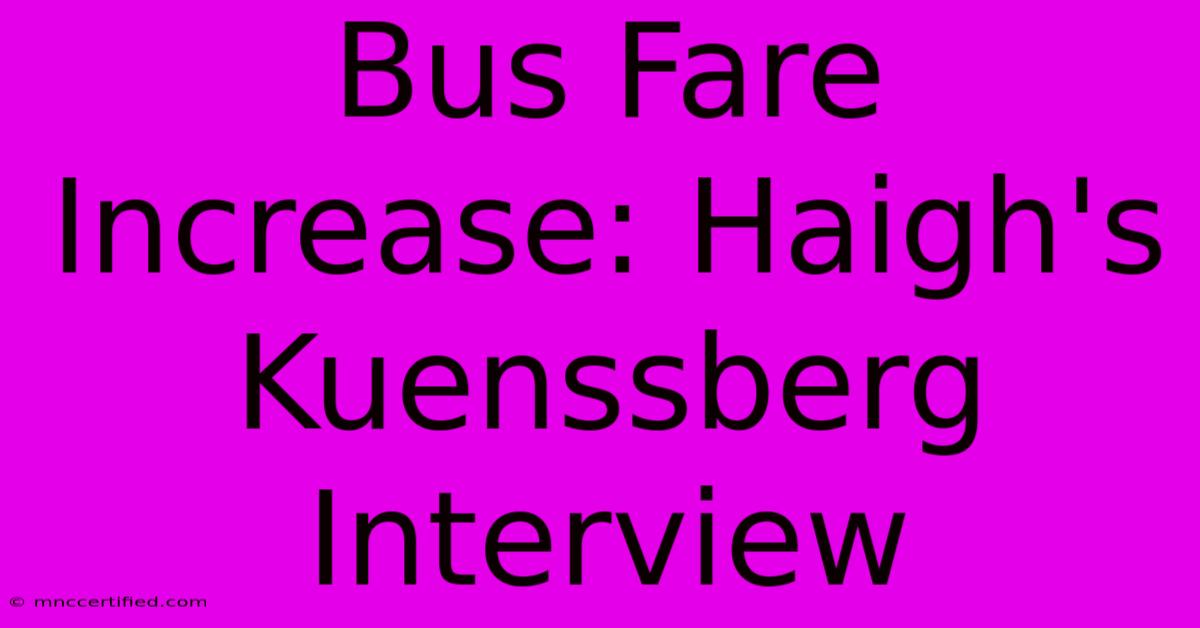Bus Fare Increase: Haigh's Kuenssberg Interview

Table of Contents
Bus Fare Increase: Haigh's Kuenssberg Interview – A Deep Dive into the Controversy
The recent interview between [Name of Bus Company Spokesperson, e.g., Sarah Haigh] and Sophie Kuenssberg on [News Outlet, e.g., BBC’s Sunday Morning] regarding the proposed bus fare increase sparked significant public debate. This article delves into the key arguments presented, the public reaction, and the potential long-term consequences of this controversial decision.
The Core of the Controversy: Why the Increase?
The proposed increase in bus fares, averaging [Percentage]% according to [Source, e.g., the company's press release], has been justified by [Bus Company Name] on several grounds. Haigh, in her interview with Kuenssberg, cited rising fuel costs, increased maintenance expenses, and the need for investment in new, more environmentally friendly buses as primary reasons. She emphasized that the increase is necessary to ensure the long-term viability and sustainability of the bus network.
Haigh's Key Arguments: A Summary
Haigh’s defense of the fare hike centered around several key points:
- Inflation and Fuel Costs: The significant increase in fuel prices directly impacts operational costs, making the current fare structure unsustainable. She presented data comparing fuel costs over the past [Number] years, highlighting the dramatic rise.
- Maintenance & Infrastructure: Maintaining a reliable and safe bus network requires significant investment in repairs and infrastructure upgrades. This includes regular servicing, parts replacement, and improvements to bus stops and routes.
- Investment in Green Technology: Haigh stressed the company's commitment to reducing its carbon footprint. The fare increase, she argued, would partly fund the transition to a fleet of cleaner, more efficient buses.
- Maintaining Service Levels: The company aimed to assure the public that the fare increase would not compromise service levels. Any additional revenue would be reinvested to maintain existing routes and potentially even expand services in the future.
Public Backlash: A Growing Concern
Despite Haigh's attempts to justify the increase, public reaction has been largely negative. Social media platforms are ablaze with complaints about the unaffordability of the proposed fares, particularly for low-income individuals and families. Many commuters feel the increase is disproportionate to the perceived improvements in service.
Key Criticisms of the Fare Increase
- Unaffordability: The most common criticism centers on the potential impact on lower-income households who rely on public transport. The increase is viewed as a significant burden on already strained budgets.
- Lack of Transparency: Some critics argue that the company has not been transparent enough about its financial situation and how the additional revenue will be allocated. Calls for greater accountability and detailed financial reports are growing.
- Alternative Solutions: Many suggest exploring alternative solutions to address the rising costs, such as government subsidies or efficiency improvements within the company.
Long-Term Implications: A Looming Question
The long-term consequences of this fare increase remain uncertain. While the company hopes to secure its financial stability and invest in improvements, the negative public sentiment could lead to reduced ridership. This, in turn, could create a vicious cycle, potentially necessitating further fare increases or service reductions in the future.
Potential Outcomes
- Reduced Ridership: Higher fares could discourage bus use, leading to a decline in passenger numbers and potentially impacting the company's revenue.
- Increased Car Usage: Higher fares might encourage commuters to switch back to private vehicles, contributing to increased traffic congestion and environmental concerns.
- Political Pressure: The public outcry could lead to political intervention, with the government potentially stepping in to regulate fares or provide financial support.
Conclusion: Navigating the Future of Public Transport
The bus fare increase controversy highlights the delicate balance between ensuring the financial sustainability of public transport and maintaining its affordability and accessibility for all. The interview between Haigh and Kuenssberg served as a platform for presenting both sides of the argument, yet the lasting impact of this decision remains to be seen. Open communication, transparency, and a willingness to explore alternative solutions will be crucial in navigating this challenging situation and ensuring a viable future for public transport.

Thank you for visiting our website wich cover about Bus Fare Increase: Haigh's Kuenssberg Interview. We hope the information provided has been useful to you. Feel free to contact us if you have any questions or need further assistance. See you next time and dont miss to bookmark.
Featured Posts
-
Travis Hunters Catch Fresh Perspective
Nov 17, 2024
-
Wales World Cup High Fades Record Low Risk
Nov 17, 2024
-
2024 Georgia Tennessee Odds And Line
Nov 17, 2024
-
Best Places To Invest In Austin Tx
Nov 17, 2024
-
November 16th Football Game Box Score Vs Smu
Nov 17, 2024